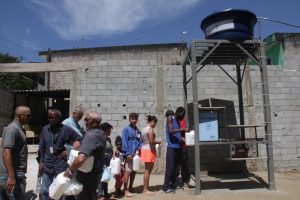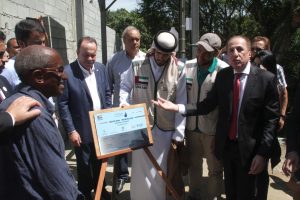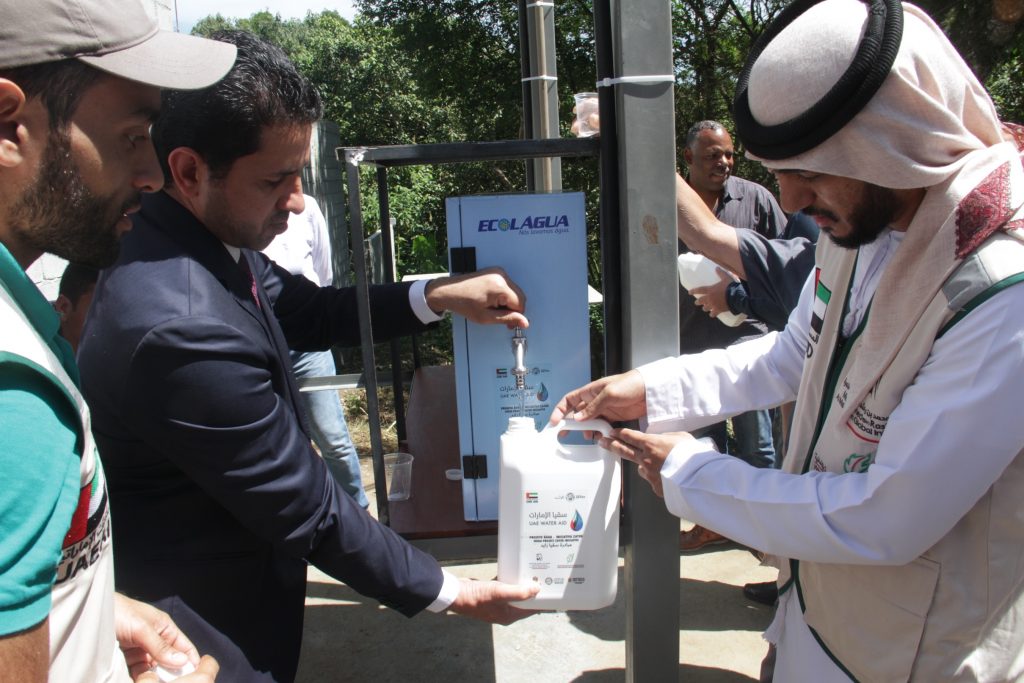São Paulo – Since last Monday (10), some residents in the São Paulo outskirts have fresh water near them for the first time: it was the day the pilot project Water, Health and Life (Água, Saúde & Vida) got launched. In attendance were delegates from the United Arab Emirates’ Mohammad Bin Rashid Al Maktoum Global Initiatives Foundation and lots of locals from Marsilac, a neighborhood in the city’s southernmost Parelheiros subdistrict.
The Federation of Muslim Associations in Brazil (Fambras) and the UAE-based foundation chose the location for the first water treatment station. “This was our pilot, and both the government and the population welcomed it. The result was amazing and extremely motivating. Those people would walk about 2 km to get drinking water,” Fambras vice president Ali Zoghbi told ANBA.

In order to install the water purifier, the two organizations invested about USD 23,000 between them. “We have a sector at Fambras called ‘Sakia Dubai’ (sakia means to quench one’s thirst).” In this project we had a conflation of budgets. The bulk of it got funded by the Foundation,” said Zoghbi.
Brazilian technology
The device at hand is Ecolágua, a creation of Brazil’s Roland Vette, who’s a researcher at the National Institute of Amazonian Research (Inpa), Roland Vette. “I think it’s quite interesting to look for genuinely national solutions. It gives priority to creative people who are seeking technological solutions in Brazil. It’s encouraging. We found a fully national solution here that matched our project,” argued Zoghbi.
The piece of equipment is already at use by riverside and indigenous populations at some points across Brazil. It relies on ultraviolet (UV) rays to purify river water and make it drinkable. In Parelheiros, Fambras made only a few minor adaptations so it can filter both underground and surface water, the Fambras vice president explained.

This is the first of many purifiers which the organizations hope to install throughout the country, including in the states of Alagoas, Rio de Janeiro, Pernambuco and the Federal District. “We have the idea of having at least 90 stations in up to two years. For starters, we will work in São Paulo. In that very area there are other communities, including indigenous ones,” he explains.
Ecolágua can purify up to 400 liters of water per hour. According to Fambras, the system eliminates up to 99.5% of bacteria and fungi from water. The device contains an UV lamp inside a metal tube. As the water runs through the tube, the UV rays disinfect it. The lamp and the device will last 3 to 4 years on average. The equipment’s battery is solar powered, therefore it can work even on cloudy days.
And who will handle maintenance? The population themselves. “It’s important to note that that people have been trained to man the station. They organized themselves as a community,” explains Ali. Fambras also trained technicians from the Parelheiros subdistrict and handed out primers with instructions for the population.
The delegates from Mohammad Bin Rashid Global Initiatives also made visits to other projects they have invested in, like Islam Solidário (Solidarity Islam). “It was a moving experience. People were very grateful for the initiative, and this evidences the UAE’s role in humanitarian aid. It’s an Islamic Arab model country which does this for everyone, because of their rather significant budget. And they ask for nothing in return,” said Ali Zoghbi.
Translated by Gabriel Pomerancblum




